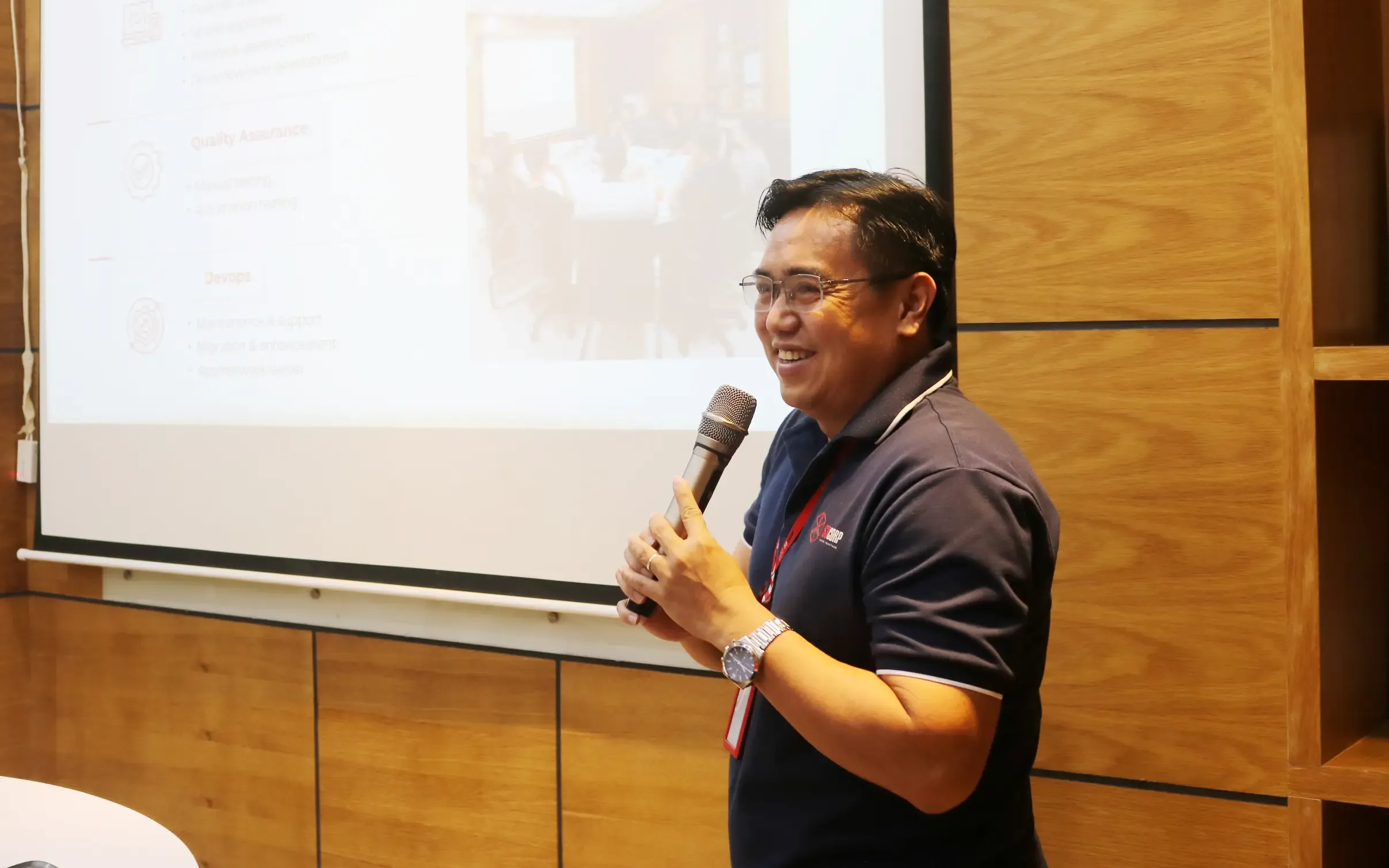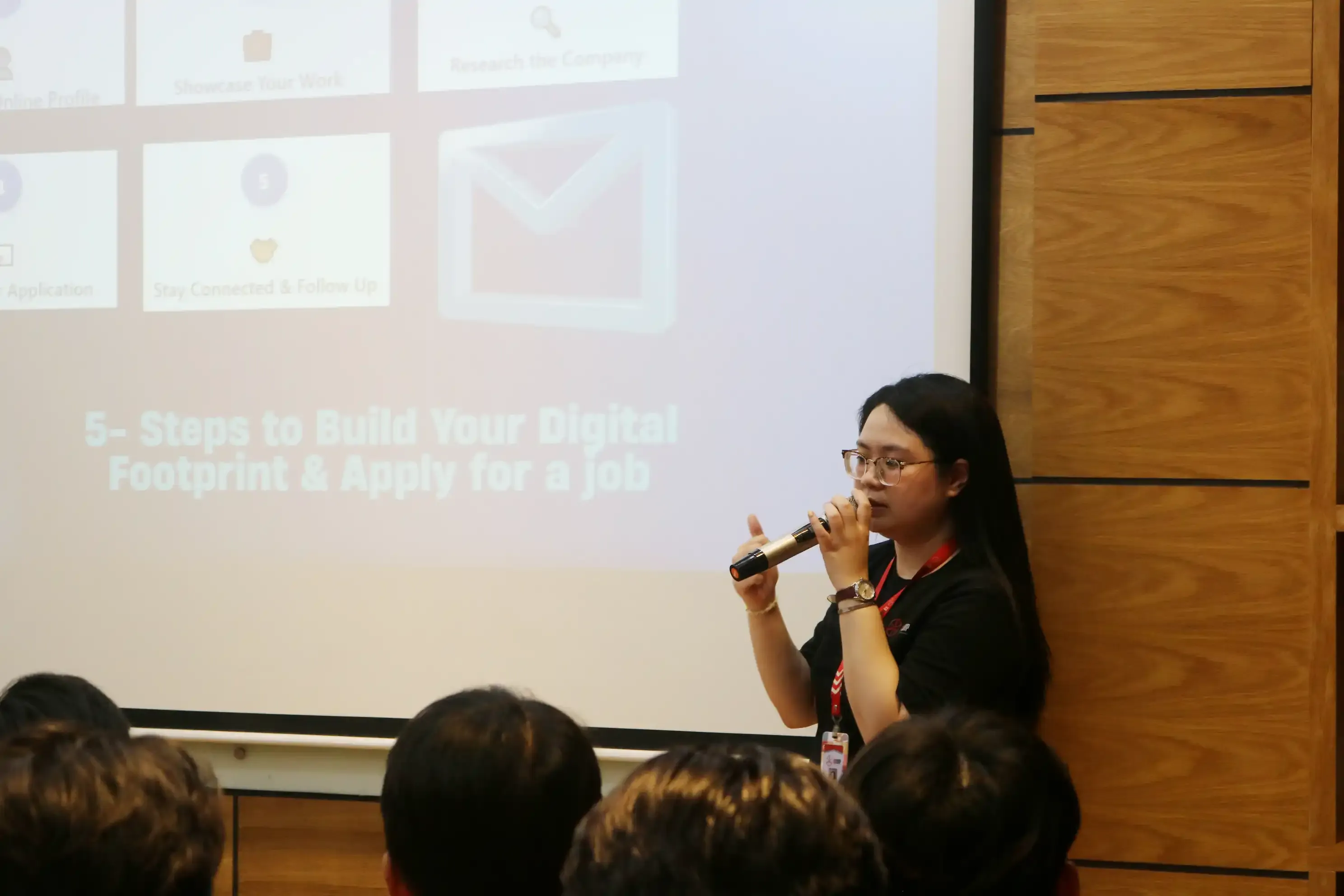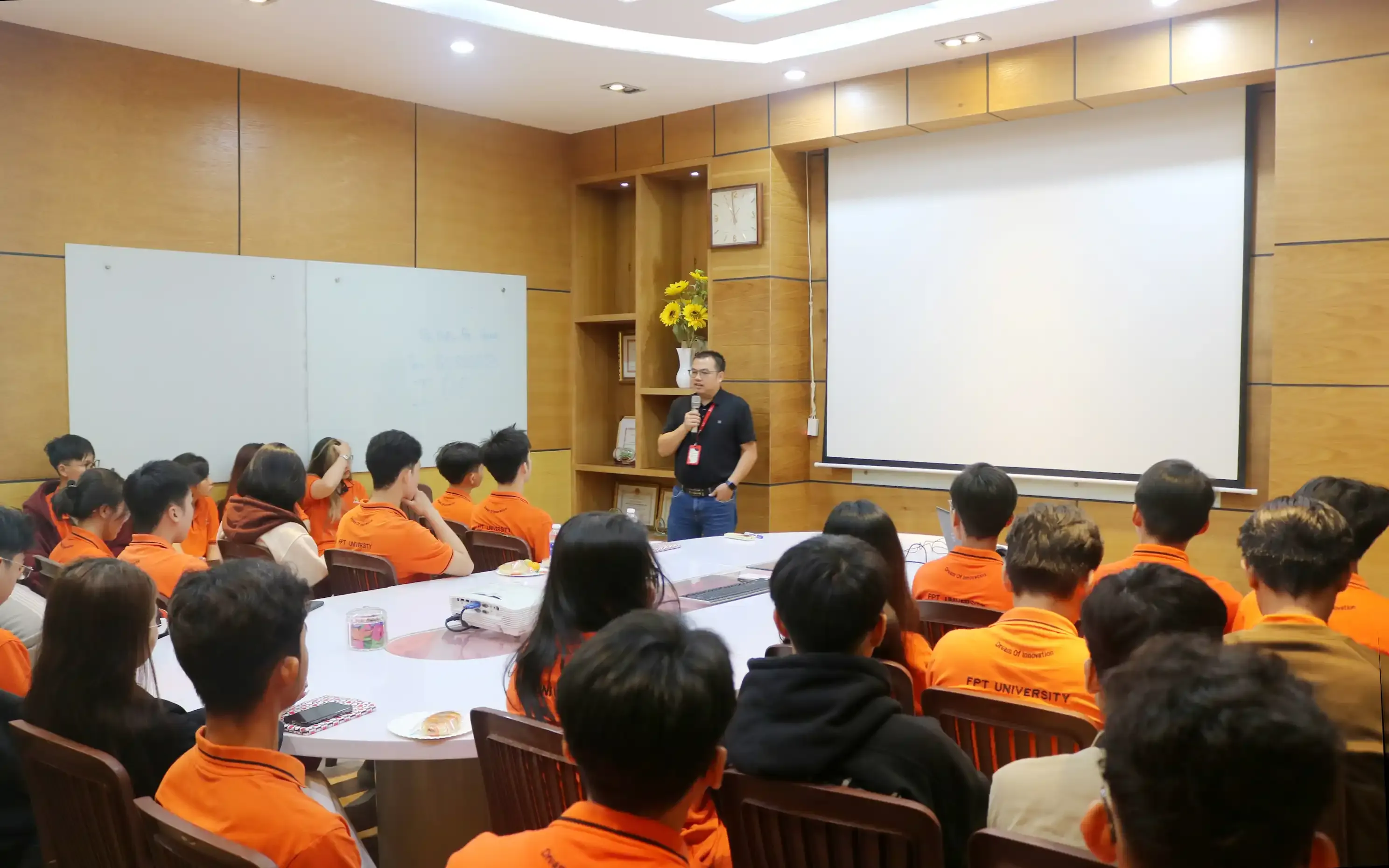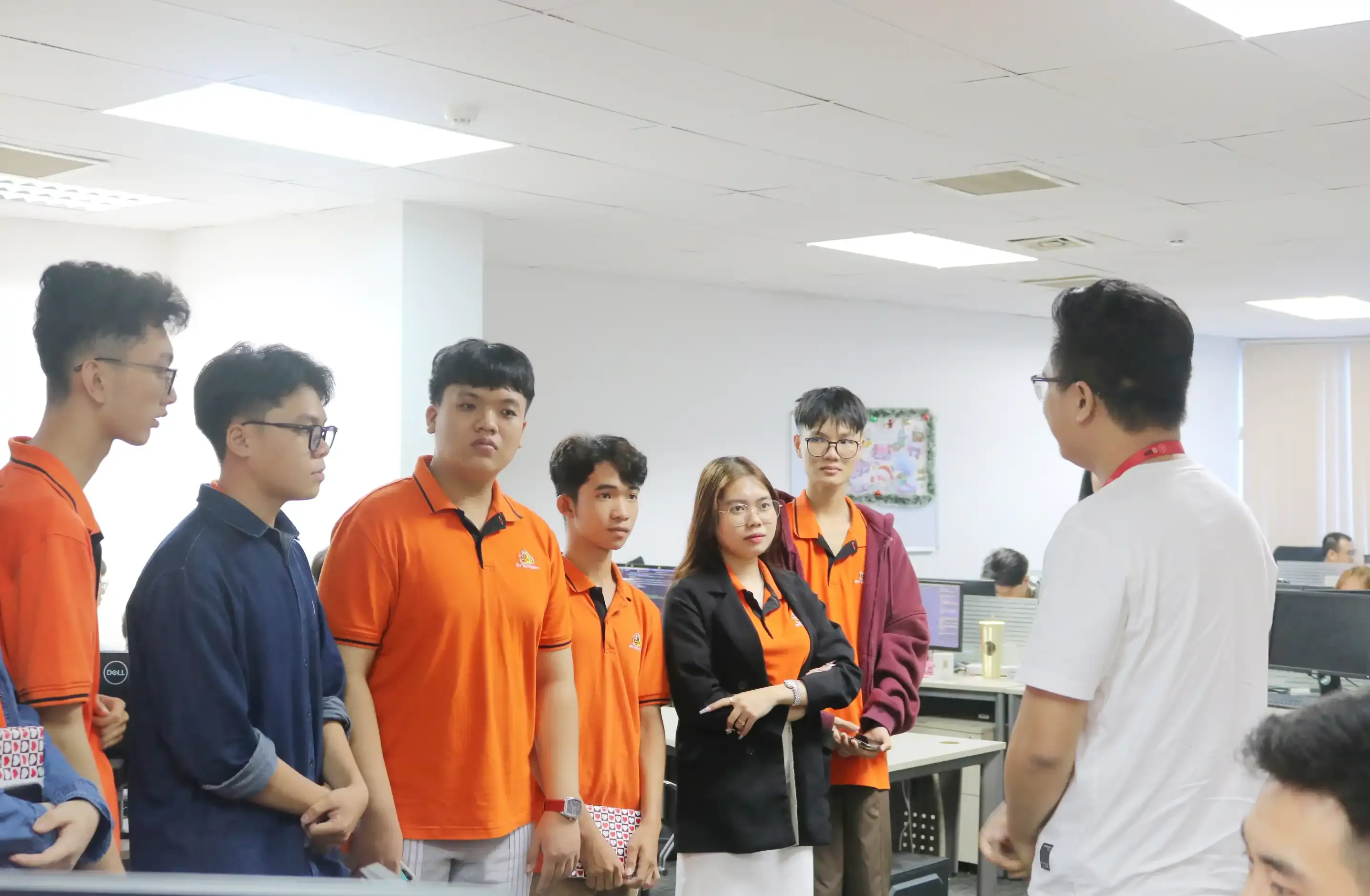S3Corp Welcomes FPT University Can Tho Students

News
S3Corp hosted FPT University Can Tho students for an immersive tech visit, showcasing real-world software development, project management insights, and career opportunities in Vietnam's growing IT industry.
07 Nov 2025
On Nov 7th, 2025, S3Corp had an opportunity to welcome teachers and students from FPT University - Can Tho Campus. The visit was more than a routine tour. It aimed to bridge the gap between academic knowledge and real-world technology practices — providing students with a clearer picture of how a software development company in Vietnam operates in the global market.
The theme for the day resonated with purpose: "Unleash Your Potential in the Tech World." For many students, this IT student company visit in Ho Chi Minh City marked their first real exposure to how international projects get built, managed, and delivered. S3Corp, a software outsourcing company with a track record of serving global clients, designed the experience to bridge the gap between academic learning and professional practice.
The day commenced with a warm welcome from the S3Corp Recruitment and HR teams. They organized interactive activities that helped introduce participants and map their diverse career aspirations. The group showed interest in roles spanning Designer, Business Analyst (BA), Quality Control (QC), and Developer, with some specifically aiming to become AI Engineers.
 Following introduction, the company sharing session provided essential context about S3Corp as both a business and a workplace. Instead of overwhelming students with corporate history, the speaker focused on three key themes: how the company serves international clients, our services, and why continuous learning defines the organizational culture.
Following introduction, the company sharing session provided essential context about S3Corp as both a business and a workplace. Instead of overwhelming students with corporate history, the speaker focused on three key themes: how the company serves international clients, our services, and why continuous learning defines the organizational culture.
Students learned that S3Corp works across multiple industries—fintech, healthcare, e-commerce, and enterprise systems. This diversity means engineers rarely work on repetitive projects. Each client brings different challenges, different technology requirements, and different business constraints. For developers seeking tech career growth, this variety accelerates skill development faster than specializing in a single domain. However, targeting a single industry first is the most effective approach for starting.
One exchange stood out. A student asked how S3Corp maintains quality across multiple projects simultaneously. The answer was candid: through rigorous code reviews, automated testing, clear documentation standards, and a culture where asking questions is encouraged, not penalized. Quality isn't achieved through heroic individual efforts. It's built into processes that entire teams follow consistently.
For students evaluating IT career opportunities, this transparency mattered. They needed to understand both the demands and the support systems that come with professional software work.
Following the agenda, building your digital footprint session addressed a reality that many students haven't fully grasped: your professional identity extends far beyond your resume. In a competitive industry, how you present yourself online, demonstrate your skills publicly, and engage with the technical community significantly influences career opportunities.
 The session covered actionable strategies for building professional visibility:
The session covered actionable strategies for building professional visibility:
Then came the contemporary twist: leveraging AI as a learning accelerator. The speaker explained how AI tools have transformed how developers learn, debug, and solve problems. Students discovered that using AI effectively isn't about replacing thinking—it's about amplifying it.
The speaker emphasized a critical distinction: AI is a tool for learning faster, not a shortcut for avoiding learning altogether. Students who use AI to understand principles deeply will outperform those who use it to copy solutions without comprehension. The technology rewards curiosity and critical thinking.
During the Q&A, students asked about balancing AI assistance with developing problem-solving skills independently. The answer was pragmatic: use AI like you'd use a senior developer for guidance, not like a search engine for copy-paste answers. Ask why solutions work, not just what the solution is. Test alternatives. Understand tradeoffs.
For students pursuing real-world project experience, this session provided a framework for accelerated learning that extends beyond university coursework. Building a digital footprint while leveraging AI strategically positions them competitively when internship opportunities arise.
Many students enter the industry believing that excellent coding skills alone guarantee success. The project management sharing session challenged that assumption directly.
The speaker, a project manager who began his career as a developer, explained how software gets delivered successfully. It's not just about writing functional code. It's about understanding requirements, coordinating across teams, managing timelines, communicating progress, and adapting when circumstances change.
 The session covered fundamental concepts that every developer should understand:
The session covered fundamental concepts that every developer should understand:
Students learned that project managers don't just create schedules and track tasks. They protect developers from constant interruptions, advocate for realistic timelines, facilitate communication across distributed teams, and ensure everyone understands both what they're building and why it matters.
One insight resonated particularly strongly: technical excellence creates opportunities, but collaboration and communication skills determine how far you advance. Developers who understand project context, communicate clearly about progress and obstacles, and work effectively with cross-functional teams become invaluable regardless of their specific technical specialization.
For students at FPT University Can Tho considering career paths beyond pure development, this session revealed project management as a viable option that leverages technical knowledge while focusing on coordination and delivery. For those committed to development roles, it provided essential context for how their work fits into larger organizational goals.
The final segment brought everything together. Students toured the office, but more importantly, they engaged directly with teams working on active projects. Project managers and team representatives shared details about their current work, providing concrete examples of concepts discussed earlier.
 The representative discussed how the team handles feature requests, manages technical debt, and coordinates with the client's internal IT team. Students asked about specific technical decisions—why microservices over monolithic architecture, how the team handles database migrations, what testing strategies they employ.
The representative discussed how the team handles feature requests, manages technical debt, and coordinates with the client's internal IT team. Students asked about specific technical decisions—why microservices over monolithic architecture, how the team handles database migrations, what testing strategies they employ.
Students also observed team workspaces, meeting areas, and collaboration tools. They saw how distributed teams coordinate across time zones, how code reviews get conducted, and how knowledge gets shared through internal documentation and technical discussions.
The tour concluded with informal conversations where students could ask questions they might have hesitated to raise in formal sessions. Topics ranged from career progression timelines to work-life balance, from salary expectations to professional development opportunities. S3Corp team members answered honestly, providing realistic perspectives without sugarcoating challenges or overselling opportunities.
S3Corp extends sincere appreciation to FPT University Can Tho for trusting us with this opportunity. Academic institutions play a critical role in preparing the next generation of technology professionals, and partnerships like this strengthen the connection between education and industry.
For the students who visited, we hope the experience provided clarity about what awaits after graduation. The tech industry needs talented, motivated individuals who are willing to learn continuously and contribute meaningfully to complex projects.
We look forward to welcoming some of you back, not as visitors, but as colleagues building solutions that matter.
Whether you have any questions, or wish to get a quote for your project, or require further information about what we can offer you, please do not hesitate to contact us.
Contact us Need a reliable software development partner?
S3Corp. offers comprehensive software development outsourcing services ranging from software development to software verification and maintenance for a wide variety of industries and technologies
Software Development Center
Headquater 307
307/12 Nguyen Van Troi, Tan Son Hoa Ward, Ho Chi Minh City, Vietnam
Office 146
3rd floor, SFC Building, 146E Nguyen Dinh Chinh, Phu Nhuan Ward, HCMC
Tien Giang (Branch)
1st floor, Zone C, Mekong Innovation Technology Park - Tan My Chanh Commune, My Phong Ward, Dong Thap Province
_1746790910898.webp?w=384&q=75)
_1746790956049.webp?w=384&q=75)
_1746790970871.webp?w=384&q=75)
